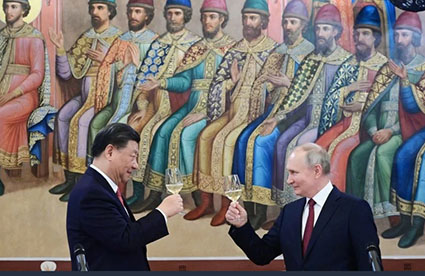Special to WorldTribune.com
 By John J. Metzler, March 22, 2023
By John J. Metzler, March 22, 2023
As they say, you can’t make this up.
In the course of just over a week, China and Russia reaffirmed their friendship and military ties, the Iranian regime proxies lashed out with rockets at U.S. forces in neighboring Syria, North Korea shot off a few more missiles, France was rocked by serious rioting, all to the backdrop of what could well be a global banking crisis sending financial shockwaves from Silicon Valley to Switzerland.
If this was part of an author’s pitch for a thriller novel, most publishers would scoff saying, “It’s too far-fetched!”

Let’s lead with the geopolitically tectonic Chinese/Russian rapprochement.
China’s President Xi Jinping visited Moscow and met with the increasingly isolated Vladimir Putin during a Kremlin summit making his ninth visit to Russia since he became president in 2013.
Traditionally one of the key objectives of U.S. foreign policy was keeping to the two Eurasian continental giants from getting too close. Yet for a few years now, both Beijing and Moscow have been emboldened and are exploiting the perceived power vacuum of the Biden Administration’s policies.
Xi’s words when leaving Moscow should be set to orchestration of melodramatic music; “Right now there are changes, the likes of which we haven’t seen for 100 years. And we are the ones driving these changes together.” Putin offered a forced icy smile.
Moscow and Beijing share common political interests; controlling the UN Security Council logjam on resolving key crises; the Ukraine war, North Korea, Burma or Syria. The Chinese government described Xi’s trip as a “peace mission” to try to sell Beijing’s twelve-point peace plan for ending the Ukraine war.
Some say Xi’s ties to the Russians are a marriage of convenience, but I beg to differ. It’s more a marriage of connivance.
Historically China never really trusted Russia and vice versa. But both wish to isolate the United States and are generally opposed to what the West likes to tout as a “rules based international order,” unless of course they were running it.
China’s massive trade with the world over the past generation notwithstanding, the Chinese Communist Party regime holds a clear political objective which envisages the Middle Kingdom as a central global player politically, economically and militarily. Massive trade deficits favoring Beijing have helped sustain the “China Dream,” as Chairman Xi likes to call it.
Xi Jinping declared an “enduring economic partnership,” with Russia. Last year, two-way trade reached a record high of $190 billion. But in 2022 the bilateral China/U.S. trade reached $691 billion with an American deficit of $383 billion favoring Beijing.
During the Moscow Summit despite the grandiose and glitzy settings of the Kremlin, it became clear that the Chinese leader was the senior partner in the relationship. Putin is still befuddled and battered from his Ukrainian war; win or lose Russia has really lost.
China wants to see the USA and Europeans tied down in Ukraine, and equally the Russians weakened as well. Why? So that Russia needs China more than ever. Remember the once lucrative Russian energy deals with Western Europe, especially Germany, are now blocked by sanctions. Now the new customers are China and India.
China’s imports of Russian crude oil have surged, second only to Saudi Arabia. Now Chinese purchases of Russian pipeline natural gas and liquified natural gas have more than doubled.
Beijing cynically profits from a Ukraine war which ties down both enemies and future rivals; The U.S., the Europeans, Japan and Russia. In parallel the People’s Republic prepares for a future invasion of democratic Taiwan, which it speciously claims, and military muscle flexing in the South China Sea.
|
During the Moscow Summit despite the grandiose and glitzy settings of the Kremlin, it became clear that the Chinese leader was the senior partner in the relationship. |
In the meantime, rogue regimes such as North Korea and Islamic Iran are stirring up trouble which the U.S. can’t afford to dismiss; North Korean “missile diplomacy” poses a clear and present danger of East Asia and the USA. Iran’s proxies in Syria and Lebanon keep the pot boiling. Should the Teheran regime acquire a nuclear weapon, all bets are off.
There’s turmoil in France, as popular rage over the government’s pension reform continues, massive demonstrations, strikes and rioting has gone beyond the cyclical and stereotypical rites of Spring and confronts not only President Emmanuel Macron but the very French Republic, posing a serious challenge to stability in a key European country.
The evolving banking crisis remains an unseen iceberg with massive government spending prompting inflation and delusional debt levels. Bank turmoil in the USA and among major European bank lenders, could well be a tipping point.
John J. Metzler is a United Nations correspondent covering diplomatic and defense issues. He is the author of Divided Dynamism the Diplomacy of Separated Nations: Germany, Korea, China (2014). [See pre-2011 Archives]
